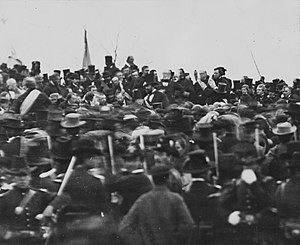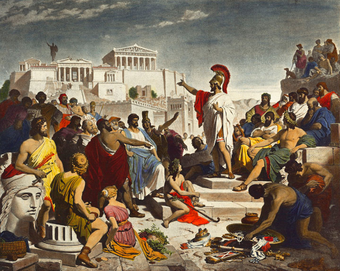Today is the anniversary of President Lincoln's delivery of his few "brief remarks" at the dedication of the new national cemetery at Gettysburg, Pennsylvania (wiki), only four or so months after the great Civil War battle there that emerged as "the high-water mark of the Confederacy."
 |
| One of the only two confirmed photos of Abraham Lincoln (sepia highlight) at Gettysburg, taken about noon, just after Lincoln arrived and some three hours before the speech. To Lincoln's right is his bodyguard, Ward Hill Lamon |
At the time, the final issue of the war was still in some doubt, and Lincoln received second billing to a lengthy speech by Dr. Edward Everett, then president of Harvard University and reputedly America's greatest orator.
Everyone's familiar with the Gettysburg Address - didn't we all have to memorize it in grammar school? But in these troubled times, its mere 272 words remain well worth reading again. The full text is below.
By the way, Garry Wills' brilliant study Lincoln at Gettysburg analyzes the Gettysburg Address in terms of its role in defining the ethos of the United States for subsequent generations, while also tracing the antecedents of Lincoln's argument and the structure of his peerless prose back to Thucydides' account of Pericles' 430 B.C funeral oration at the end of the first year of the Peloponnesian War. (Wills notes that despite the popular view that Lincoln generally preferred short, pithy utterances, the final sentence of the Gettysburg Address is 84 words long - almost a third of the whole.)
Here's Wikipedia on the similarities:
Lincoln's speech, like Pericles', begins with an acknowledgment of revered predecessors: "Four score and seven years ago, our fathers brought forth upon this continent..."; Lincoln, like Pericles, then praises the uniqueness of the State's commitment to democracy: "..a new nation, conceived in liberty and dedicated to the proposition that all men are created equal...government of the people, by the people, and for the people..."; Lincoln, like Pericles, addresses the difficulties faced by a speaker on such an occasion, "...we cannot dedicate, we cannot consecrate, we cannot hallow this ground"; Lincoln, like Pericles, exhorts the survivors to emulate the deeds of the dead, "It is for us the living, rather, to be dedicated here to the great task remaining before us"; and finally, Lincoln, like Pericles, contrasts the efficacy of words and deeds, "The brave men, living and dead, who struggled here, have consecrated it, far above our poor power to add or detract...The world will little note, nor long remember what we say here, but it can never forget what they did here." It is uncertain to what degree Lincoln was directly influenced by Pericles' Funeral Oration.
Wills never claims that Lincoln drew on it as a source, though Edward Everett, who delivered a lengthy oration at the same ceremony at Gettysburg, began by describing the "Athenian example".
This 2014 article on Obama's recitation of the speech (the 150th anniversary) in which he left out the words "under God" is from WMAL. Excerpts:
WASHINGTON -- One nation under God? Under President Obama, maybe not so much.
 |
| Union soldiers dead at Gettysburg, July 1963 |
In advance of the 150th anniversary of the Gettysburg Address (full text below), which President Abraham Lincoln delivered on November 19, 1863, filmmaker Ken Burns gathered every living President, along with several prominent members of Congress, celebrities and news media stars to deliver the address themselves. Burns edited the individual speeches into one final mashup that is available on the site, but he also provided the complete speech as delivered by each individual dignitary.
Curiously enough, in his version of the speech, President Barack Obama's delivery contained an omission - in a line that every other celebrity delivered as "that this nation, under God, shall have a new birth of freedom" (click here for proof of that), the President left out the words "under God."You can watch all of the speeches at learntheaddress.org.
Gettysburg Address full text:
Four score and seven years ago our fathers brought forth on this continent a new nation, conceived in liberty and dedicated to the proposition that all men are created equal. Now we are engaged in a great civil war, testing whether that nation or any other nation so conceived and so dedicated can long endure.
We are met on a great battlefield of that war. We have come to dedicate a portion of that field as a final resting place for those who here died that that nation might live. It is altogether fitting and proper that we do this. But in a larger sense, we cannot dedicate, we cannot consecrate, we can not hallow this ground. The brave men, living and dead, who struggled here have consecrated it far above our poor power to add or detract.
The world will little note nor long remember what we say here, but it can never forget what they did here. It is for us the living rather to be dedicated here to the unfinished work which they who fought here have thus far so nobly advanced. It is rather for us to be here dedicated to the great task remaining before us - that from these honored dead we take increased devotion to that cause for which they gave the last full measure of devotion - that we here highly resolve that these dead shall not have died in vain, that this nation under God shall have a new birth of freedom, and that government of the people, by the people, for the people, shall not perish from the earth.
~ Abraham Lincoln ("The Gettysburg Address," 19 November 1863)
Here's a brief documentary which includes most of the available photographs of Lincoln, some photos of battlefields, and several (non-photographic) illustrations from contemporaneous newspaper accounts. It also describes the historical context of the speech and Lincoln's feeling that it had been a failure:
This video is a series of photos from the morning after the battle, set to music:
At the Smithsonian, a Battle of Gettysburg Interactive Map.
Related: Paper prints retraction for 1863 article calling Gettysburg address "silly remarks"; retraction written in the style of Gettysburg Address (read the whole thing!):
Seven score and ten years ago, the forefathers of this media institution brought forth to its audience a judgment so flawed, so tainted by hubris, so lacking in the perspective history would bring, that it cannot remain unaddressed in our archives.Mental Floss has an excellent post - Gettysburg: The Great Reunion of 1913.

Why would our illustrious leader leave out "under God"? Curious omission huh?
ReplyDeletePresident Obama read the "Nicolay Copy," the first of five known written versions of the Address. It's clearly explained at the site learntheaddress.org site that was listed in this blog post.
ReplyDeleteAlways a good idea to review your own citations before posing questions.
You answered 'what' but not 'why'.
ReplyDeleteThank you for this fascinating post, Keep blogging. Keep writing
ReplyDeleteI am happy I observed this website on Google. The site is fantastic and has a lot a good points
ReplyDeleteThis is a wonderful blog that I want to read it twice! Thanks ! Keep it up.
ReplyDeleteI feel very grateful that I read this article. Still waiting for some, Thanks
ReplyDelete